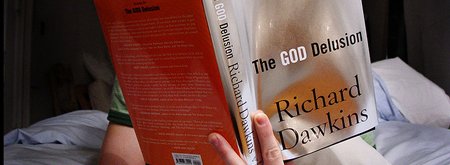The Faith Based Dawkins
At the start of 2005, online magazine ‘Edge The World Question Centre’ posed the following question to a number of scientific intellectuals:
‘What do you believe is true even though you cannot prove it?’
This is an excellent question, to which many responses can and have been given. However, of the 120 responses garnered and published by The Edge, the answer given by Oxford University’s ‘Professor for the Public Understanding of Science’, Dr Richard Dawkins, has received the most attention (at least within the British media). Dawkins’ Credo has been reported by news.telegraph and Guardian Unlimited, and Dawkins was interviewed on BBC Radio 4’s Sunday-morning current affairs magazine Broadcasting House (09/01/05), where he said:
Darwinism is the explanation of life on this planet, but I believe that all life, all intelligence, all creativity and all ‘design’ anywhere in the universe, is the direct or indirect product of Darwinian natural selection. It follows that design comes late in the universe, after a period of Darwinian evolution. Design cannot precede evolution and therefore cannot underlie the universe.[1]
As Roger Highfield observes in the Telegraph, Dawkins’ belief that evolution explains all life, creativity, intelligence and design anywhere in the universe: ‘means that there is no need for a god to design the universe.’[2]
Dawkins thinks he can prove that evolution accounts for all life, intelligence, creativity and (crucially) all design on earth, but he says he cannot prove that it accounts for all life, intelligence, creativity and design in the universe. Therefore, whatever we make of evolution as an explanation of life on earth[3], we need to recognize that only from the unproven generalisation that Darwinian evolution accounts for all life, intelligence, creativity and (crucially) design in the universe does it follow that: ‘Design cannot precede evolution and therefore cannot underlie the universe.’[4] Indeed, that particular conclusion only follows from the premise that evolution must (rather than does) account for all life, intelligence, creativity and (crucially) design in the universe. Such an a priori assertion is clearly metaphysical in nature rather than scientific. It seems clear, then, that Dawkins believes both that evolution must explain any and all ‘design’ in the universe and that there is no divine designer because he believes that metaphysical naturalism is true. As Phillip E. Johnson notes: ‘A theory of biological origins that is in a general way like Darwinism follows fairly straightforwardly from the proposition that God is an illusion and nature is therefore all that exists...’[5] Hence: ‘Darwinism is the answer to a specific question that grows out of philosophical naturalism... The question is: How must creation have occurred if we assume that God had nothing to do with it?’[6] Answering this question is not at all the same as answering this question: ‘How did creation occur?’ A naturalist like Dawkins has to give the same answer to both questions, whereas an agnostic or a theist may or may not give the two questions quite different answers, as the evidence dictates.[7]
Moreover, since it is the Darwinian generalisation Dawkins relies upon to prove that design ‘cannot underlie the universe’[8], his admission that the Darwinian generalisation is something he believes even though he cannot prove it, shows that Dawkins’ belief that design does not underlie the universe is something he believes even though he cannot prove it. This is as much as to say that metaphysical naturalism is something Dawkins believes even though he cannot prove it.
How extraordinary to find Dawkins, who regularly uses evolution as a stick to beat belief in a designer (such as God), admitting that his stick is a conjecture, and his belief in it a matter of the kind of faith without evidence that he attributes to, and scorns in, religious believers. For example, during a lecture at the Edinburgh International Science Festival Dawkins said: ‘If you ask people why they are convinced of the truth of their religion, they don't appeal to evidence. There isn’t any... I will respect your views if you can justify them. But if you justify your views only by saying you have faith in them, I shall not respect them.’[9] (This is, of course, not what religious believers usually mean by ‘faith’. As Alban McCoy writes: ‘there is no reason without faith, and no faith without reason: they are inextricably connected. They appear disjointed and opposed only when reason is understood in the narrow sense of positivism and faith is understood in the narrow sense of fideism.’[10])
In an open letter written to his daughter Juliet on her tenth birthday (and published in A Devil’s Chaplain), Dawkins advises her to only accept beliefs supported by evidence. ‘Have you ever wondered how we know the things that we know?’[11], asks Dawkins. The answer, he says (and he does seem to mean the answer), is ‘evidence.’[12] Dawkins advises Juliet:
Next time somebody tells you something that sounds important, think to yourself: ‘Is this the kind of thing that people probably know because of evidence? Or is it the kind of thing that people only believe because of tradition, authority or revelation?’ And next time somebody tells you that something is true, why not say to them: ‘What kind of evidence is there for that?’ And if they can’t give you a good answer, I hope you’ll think very carefully before you believe a word they say.[13]
However, when Dawkins says that evolution shows that design cannot precede evolution (and so cannot underlie the universe) - which certainly sounds an important claim - and we ask him ‘What kind of evidence is there for that?,’ we discover that there isn’t any! Instead, Dawkins’ argument against design depends upon a hypothesis supported, not by evidence, but by the assumption that naturalism is true. And while Dawkins may seem to argue for naturalism and against God by arguing for evolution and then arguing that evolution ‘reveals a world without design’[14], he actually begins with the assumption that naturalism is true, deduces the generalisation that evolution must account for any and all purported design, and then presents this generalisation as if it justifies naturalism! The whole argumentative procedure begs the question.
Comparing Dawkins' Blind Faith with Flew's Evidence
The most that might be said for Dawkins’ conjecture about the truth of generalised evolution is that it is a simpler explanation than any explanation involving design, and that, by Occam’s Razor, it should therefore be tentatively favoured as long as it appears adequate. However, even if this is the correct way to assign the burden of proof[15], even if we exclude arguments besides the design argument that might support a belief in design[16], and even if we exclude a host of considerations that might lead us to question the sufficiency of evolution as a scientific theory[17], we cannot ignore the fact that evolution can have no pretence to address or explain its own preconditions. The preconditions of evolution, which include biological macromolecules[18] and the finely tuned basic physical laws of the cosmos[19], cannot be explained by evolution. As philosopher Antony Flew observes:
It seems to me that Richard Dawkins constantly overlooks the fact that Darwin himself, in the fourteenth chapter of The Origin of Species, pointed out that his whole argument began with a being which already possessed reproductive powers. This is the creature the evolution of which a truly comprehensive theory of evolution must give some account. Darwin himself was well aware that he had not produced such an account. It now seems to me that the finding of more than fifty years of DNA research have provided materials for a new and enormously powerful argument to design.[20]
Indeed, this new design argument is so powerful that Flew, ‘an icon and champion for unbelievers for decades’[21], a man who has been called ‘the world’s most influential philosophical atheist’[22], has changed his mind because of it, letting it be widely known in December 2004 that he is now a theist[23] because: ‘the case for an Aristotelian God who has the characteristics of power and also intelligence, is now much stronger than it ever was before.’[24]
In Flew’s assessment, the scientific data indicates that one can’t argue, as he used to argue, that there isn’t ‘any good evidence [to] postulate anything behind or beyond this natural universe’[25] and that therefore ‘the most fundamental laws of nature, must. . . be taken as the last words in any series of answers to questions as to why things are as they are.’[26] Instead, Flew now argues that there is good reason to postulate something beyond the natural universe precisely because the fundamental laws of nature cannot be taken as the last word in all series of answers to questions about why things are as they are. Specifically, this can not be done with regard to the origin of life. On the one hand, says Flew, naturalistic efforts have failed to provide ‘a plausible conjecture as to how any of these complex molecules might have evolved from simple entities’,[27] and ‘It has become inordinately difficult even to begin to think about constructing a naturalistic theory of the evolution of that first reproducing organism.’[28] On the other hand: ‘The enormous complexity by which the results were achieved look to me like the work of intelligence.’[29]
Richard Dawkins has made it clear that he argues against God on the basis of a generalised evolutionary assumption which he believes although he can’t prove it, while Antony Flew has made it clear that he now argues for God on the basis of scientific evidence that evolution is in principle unable to explain. Dawkins gives the impression that God belongs in a box marked ‘Things people believe even though they cannot prove it’, but the past month has seen Dawkins place atheism in the very same box, just as Flew took God out.
Recommended Reading
Antony Flew, ‘My Pilgrimage from Atheism to Theism: An Exclusive Interview with Former British Atheist Professor Antony Flew’ @ www.biola.edu/antonyflew/flew-interview.pdf
Peter S. Williams, ‘A Change of Mind for Antony Flew’ @ www.arn.org/docs/williams/pw_antonyflew.htm
Peter S. Williams, ‘Darwin’s Rottweiler & the Public Understanding of Scientism’ @ www.arn.org/docs/williams/pw_dawkinsfallacies.htm
Peter S. Williams, ‘Is Life Designed or Designoid? Dawkins, Science & the Purpose of Life’ @ www.arn.org/docs/williams/pw_purposeoflife.htm
References
[1] Dawkins, Broadcasting House, BBC Radio 4, Sunday January, 2005.
[2] Roger Highfield, ‘Science’s scourge of believers declares his faith in Darwin’.
[3] Cf. Robert C. Newman et al, ‘The Status of Evolution as a Scientific Theory’ @ www.arn.org/docs/newman/rn_statusofevolution.htm.
[4] Dawkins @ www.edge.org/q2005/q05_6.html.
[5] Phillip E. Johnson Reason in the Balance (Downers Grove: IVP), p.16.
[6] Phillip E. Johnson, ‘What is Darwinism’, Objection Sustained (Downers Grove: IVP, 1998), p.33.
[7] cf. Alvin Plantinga, ‘When Faith and Reason Clash: Evolution and the Bible’ @ www.asa3.org/ASA/dialogues/Faith-reason/CRS9-91Plantinga1.html.
[8] Dawkins @ www.edge.org/q2005/q05_6.html.
[9] Richard Dawkins, lecture at the Edinburgh International Science Festival.
[10] Alban McCoy An Intelligent Person’s Guide to Catholicism (Continuum), p.3.
[11] Richard Dawkins A Devil’s Chaplain (Weidenfeld & Nicolson, 2003), p.242.
[12] Dawkins A Devil’s Chaplain, p.242.
[13] Dawkins, A Devil’s Chaplain, p.248.
[14] Cf. the subtitle of The Blind Watchmaker.
[15] In ‘The Check Is In The Mail: Why Darwinism Fails to Inspire Confidence’ (William A. Dembski ed., Uncommon Dissent: Intellectuals who find Darwinism Unconvincing,ISI Books, 2004), philosopher Robert C. Koons observes: ‘The Western philosophical tradition has bequeathed us two competing metaphysical models: one in which everything is to be explained ultimately in terms of blind and purposeless forces (the materialistic model); and one in which purposefulness is a fundamental and irreducible reality (the teleological model).’ The most important question ‘from an epistemological point of view’, writes Koons, is: ‘where should we locate the presumption of truth, and where the burden of proof?’ Koons argues:
There are compelling grounds for placing the burden of proof on the materialistic model. Even stalwart Darwinists... admit that the defining task of biology is to explain the existence of things that appear to be designed. Cicero, in On the Nature of the Gods, Book II, reports Aristotle’s cave analogy: if a group of people had spent all of their lives underground and then emerged on the surface, they would be bound to think of the biologically rich world they discovered there to be the product of intelligence. Only familiarity dulls our sense of wonder at the craftsmanship of nature. In his essay on the Intellectual Powers of Man, eighteenth-century Scottish philosopher Thomas Reid cites the capacity to recognize the signs of intelligent agency as part of the basic equipment of the human mind... When this basic faculty of intelligence-recognition considers the machinery of living things, the clear answer it delivers is yes, there is intelligence and purposefulness displayed in such machinery.
While ‘the natural deliverances of our sense of intelligence can be defeated’, says Koons: ‘there is an undeniable burden of proof that must first be assumed.’
[16] Cf. C. Stephen Evans, ‘The Mystery of Persons and Belief in God’ @ www.leaderu.com/truth/3truth07.html; Alvin Plantinga, ‘Two Dozen (or so) Theistic Arguments’ @ www.homestead.com/philofreligion/files/Theisticarguments.html; Victor Reppert, ‘The Argument from Reason’ @ http://go.qci.tripod.com/Reppert-interview.htm.
[17] Cf. Michael J. Behe, ‘Molecular Machines’ @ www.arn.org/docs/behe/mb_mm92496.htm; Stephen C. Meyer et al, ‘The Cambrian Explosion: Biology’s Big Bang’ @ www.discovery.org/scripts/viewDB/filesDB-download.php?id=29; Jonathan Wells, ‘Survival of the Fakest’ @ www.discovery.org/articleFiles/PDFs/survivalOfTheFakest.pdf; John Angus Campbell & Stephen C. Meyer’s (eds.), Darwinism, Design, And Public Education, (Michigan State University Press, 2003); William A. Dembski, No Free Lunch, (Rowman & Littlefield, 2002); William A. Dembski (ed.), Uncommon Dissent: Intellectuals Who Find Darwinism Unconvincing, (ISI Books, 2004); David Swift, Evolution Under the Microscope, (Leighton Academic, (2002).
[18] Cf. Stephen C. Meyer, ‘DNA and Other Designs’ @ www.arn.org/docs/meyer/sm_dnaotherdesigns.htm.
[19] Cf. William Lane Craig, ‘Review: The Design Inference – Eliminating chance through small possibilities’ @ www.leaderu.com/offices/billcraig/docs/design.html.
[20] Antony Flew, ‘My Pilgrimage from Atheism to Theism: An Exclusive Interview with Former British Atheist Professor Antony Flew’ @ www.biola.edu/antonyflew/flew-interview.pdf.
[21] Craig J. Hazen, Preface to ‘My Pilgrimage from Atheism to Theism: An Exclusive Interview with Former British Atheist Professor Antony Flew’ @ www.biola.edu/antonyflew/flew-interview.pdf.
[22] Comment quoted by Gary R. Habermas, ‘My Pilgrimage from Atheism to Theism: An Exclusive Interview with Former British Atheist Professor Antony Flew’, ibid.
[23] Cf. ABC News, ‘Famous Atheist Now Believes in God’ @ abcnews.go.com/US/wireStory?id=315976.
[24] Antony Flew, ‘My Pilgrimage from Atheism to Theism: An Exclusive Interview with Former British Atheist Professor Antony Flew’ @ www.biola.edu/antonyflew/flew-interview.pdf.
[25] Antony Flew, quoted by ‘World’s Most Famous Atheist Accepts Existence of God, Cites Modern Science’, @ www.thewonderoftheworld.com/newsrelease-flew.php.
[26] Antony Flew God and Philosophy second edition, (Hutchinson of London, 1966), p.194.
[27] Antony Flew, ‘My Pilgrimage from Atheism to Theism: An Exclusive Interview with Former British Atheist Professor Antony Flew’, op. cit.
[28] Antony Flew Philosophy Now Issue 47, August/September 2004, p.22.
[29] Antony Flew, quoted by ‘World’s Most Famous Atheist Accepts Existence of God, Cites Modern Science’, op cit.
© 2005 Peter S. Williams
All rights reserved. International copyright secured.



